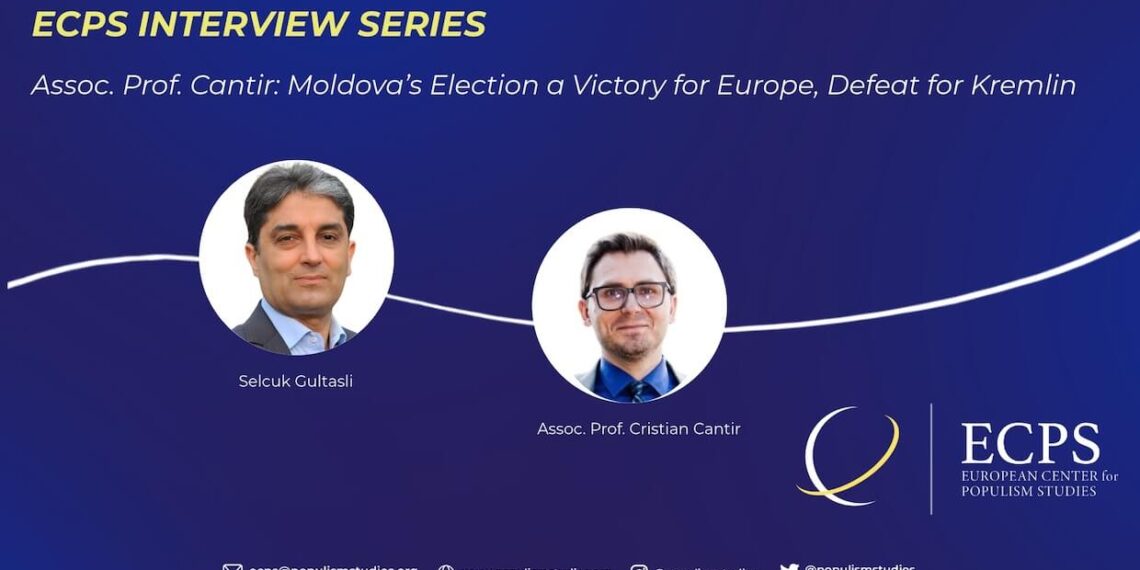In an interview with ECPS, Dr. Cristian Cantir (Oakland University) described Moldova’s 2025 parliamentary elections as “a major win for the European Union and a major defeat for the Kremlin.” Despite massive Russian interference—including vote-buying, cryptocurrency transfers, and efforts to incite unrest—Moldovan institutions responded with unprecedented consistency, demonstrating what Dr. Cantir calls a “confirmation of Moldova’s democratic resilience.” Yet, he warns that Moscow remains influential through populist narratives exploiting poverty and weak institutions. The results, he argues, reflect both the enduring popularity of EU integration and the failures of pro-Russian opposition parties. For Dr. Cantir, Moldova offers a striking example of how Russian influence faces diminishing returns when met with institutional strength and sustained Western support.
Interview by Selcuk Gultasli
The outcome of Moldova’s 2025 parliamentary elections has been widely interpreted as a defining moment in the country’s European trajectory and its long struggle to resist Russian influence. In an interview with the European Center for Populism Studies (ECPS), Dr. Cristian Cantir, Associate Professor of Political Science at Oakland University, framed the results in stark geopolitical terms: “At a macro level, I would say this election represents a major win for the European Union and a major defeat for the Kremlin. I think it’s fair to frame it in those terms as a general way of understanding what happened.”
Dr. Cantir’s assessment reflects not only the electoral success of the pro-European Action and Solidarity Party (PAS), but also the broader resilience of Moldova’s democratic institutions in the face of Moscow’s sustained interference campaigns. International observers judged the elections to be generally free and fair, even amid bomb threats, electoral violations, and widespread attempts at corruption. As Dr. Cantir explains, this points to a “confirmation of Moldova’s democratic resilience,” if not yet full consolidation, as state institutions and law enforcement demonstrated an increased capacity to respond to hybrid threats.
Russia’s interference toolkit—long tested in Moldova—appeared less effective in this cycle. The Kremlin poured more resources into the effort, funding political actors, experimenting with cryptocurrency transfers, and attempting to stoke unrest. Yet, Dr. Cantir argues, these strategies delivered “diminishing returns” in a political environment where institutions had grown more proactive. “Moscow has been somewhat taken aback by the extent to which Moldovan institutions have now responded in such a consistent way to Russian interference,” he observes. The shift suggests that the Kremlin’s approach is increasingly constrained by its own reliance on disinformation and narratives fed by loyal pro-Russian politicians, which often fail to reflect the realities of Moldovan society. As Dr. Cantir notes, “some of the claims you see in Russian propaganda are so laughable and rudimentary… you wonder whether they actually believe them, because they don’t even work as propaganda.”
Still, Russia remains a formidable actor in Moldova’s domestic politics. Populist narratives that exploit socioeconomic hardship, corruption, and weak institutions continue to resonate with segments of the population, leaving Moldova’s pro-European course vulnerable to authoritarian retrenchment. Dr. Cantir highlights the need for PAS and other pro-EU forces to demonstrate tangible benefits of integration to disengaged citizens, warning that otherwise they may fall “much more easily to populist messaging” that is Eurosceptic and pro-Russian in nature.
Ultimately, the Moldovan case illustrates both the persistence and limitations of Russia’s hybrid influence operations in the post-Soviet space. Unlike Ukraine or Georgia, where Moscow has resorted to military force, Moldova demonstrates how resilience is possible when domestic institutions respond effectively and Western partners provide consistent support. As Dr. Cantir emphasizes, this election represents more than just a partisan victory—it is a symbolic moment of geopolitical realignment: a triumph for Europe, and a setback for the Kremlin.


